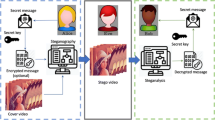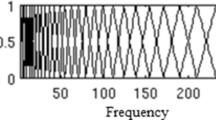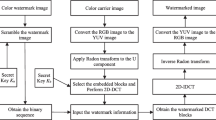Abstract
In traditional watermarking algorithms, the insertion of a binary watermark into the host signal causes the host signal to introduce some perceptible quality degradation. Another problem is the inherent conflict between imperceptibility and robustness. We proposed a zero-watermarking technique to solve these problems. The present study aims to represent a new audio zero-watermarking algorithm robust to audio signal processing attacks, especially MP3 compression, high-pass filtering, and re-sampling attacks. The proposed algorithm simulates the desired attacks and extracts the features from the simulated audio signals as the training data for a supervised learner. The present study compares two traditional audio watermarking algorithms and two audio zero-watermarking algorithms with the proposed method in terms of robustness. We simulated ten different attacks with four other audio software editors. The experiments show the superiority of the proposed method in terms of two evaluation criteria, bit error rate and normalized correlation coefficient.

































Similar content being viewed by others
Data Availability
Not Applicable.
Notes
This files have been selected from www.looperman.com.
References
W. Bender, D. Gruhl, N. Morimoto, A. Lu, Techniques for data hiding. IBM Syst. J. 35(3–4), 313–335 (1996). https://doi.org/10.1147/sj.353.0313
L. Boney, A.H. Tewfik, K.N. Hamdy, Digital watermarks for audio signals. in International Conference on Multimedia Computing and Systems—Proceedings, (1996) pp 473–480. https://doi.org/10.1109/mmcs.1996.535015
R. Chandramouli, N. Memon, Analysis of LSB based image steganography techniques. IEEE Int. Conf. Image Process. 3(February), 1019–1022 (2001). https://doi.org/10.1109/icip.2001.958299
I.J. Cox, J. Kilian, F.T. Leighton, T. Shamoon, Secure spread spectrum watermarking for multimedia. IEEE Trans. Image Process. 6(12), 1673–1687 (1997)
H.L. Dai, D. He, An efficient and robust zero-watermarking scheme for audio based on DWT and DCT. in 1st Asia Pacific Conference on Postgraduate Research in Microelectronics and Electronics, PrimeAsia 2009, (2009), pp 233–236. https://doi.org/10.1109/PRIMEASIA.2009.5397403
G. Hua, J. Huang, Y.Q. Shi, J. Goh, V.L. Thing, Twenty years of digital audio watermarking—a comprehensive review. Signal Process. 128, 222–242 (2016). https://doi.org/10.1016/j.sigpro.2016.04.005
A.E.A. Jayarani, M.R. Bhatt, D.D. Geetha, Zero watermarking on audio based on STFT. in Proceedings—2018 International Conference on Computing, Electronics and Communications Engineering, iCCECE 2018, (2019), pp 253–256. https://doi.org/10.1109/iCCECOME.2018.8658846
C.V.E. Jic, Algorithms for audio watermarking and PhD thesis, University of Oulu (2004)
M. Mosleh, H. Latifpour, M. Kheyrandish, M. Mosleh, N. Hosseinpour, A robust intelligent audio watermarking scheme using support vector machine. Front. Inf. Technol. Electr. Eng. 17(12), 1320–1330 (2016). https://doi.org/10.1631/FITEE.1500297
M.A. Nematollahi, S.A. Al-Haddad, F. Zarafshan, Blind digital speech watermarking based on Eigen-value quantization in DWT. J. King Saud Univ. Comput. Inf. Sci. 27(1), 58–67 (2015). https://doi.org/10.1016/j.jksuci.2014.03.012
C.I. Podilchuk, E.J. Delp, Digital watermarking: algorithm and application. IEEE Signal Process. Mag. 18(4), 33–46 (2001). https://doi.org/10.1109/79.939835
S.M. Pourhashemi, M. Mosleh, Y. Erfani, A novel audio watermarking scheme using ensemble-based watermark detector and discrete wavelet transform. Neural Comput. Appl. 33(11), 6161–6181 (2021). https://doi.org/10.1007/s00521-020-05389-2
J. Singh, P. Garg, A.N. De, Audio watermarking based on quantization index modulation using combined perceptual masking. Multimed. Tools Appl. 59(3), 921–939 (2012). https://doi.org/10.1007/s11042-011-0783-4
M. Steinebach, F.A. Petitcolas, F. Raynal, J. Dittmann, C. Fontaine, S. Seibel, N. Fatès, L.C. Ferri, StirMark benchmark: audio watermarking attacks. in Proceedings—International Conference on Information Technology: Coding and Computing, ITCC 2001 (Itcc), (2001), pp. 49–54. https://doi.org/10.1109/ITCC.2001.918764
S.M. Tsai, A robust zero-watermarking algorithm for audio based on LPCC. in ICOT 2013—1st International Conference on Orange Technologies, (2013), pp 63–66. https://doi.org/10.1109/ICOT.2013.6521158
X. Wang, W. Qi, P. Niu, A new adaptive digital audio watermarking based on support vector regression. IEEE Trans. Audio Speech Lang. Process. 15(8), 2270–2277 (2007). https://doi.org/10.1109/TASL.2007.906192
X. Wu, T. Fang, Research on robust audio zero watermarking algorithm based on discrete cosine transform. MATEC Web Conf. 309, 03014 (2020). https://doi.org/10.1051/matecconf/202030903014
Y. Yang, M. Lei, M. Cheng, B. Liu, G. Lin, D. Xiao, An audio zero-watermark scheme based on energy comparing. China Commun. 11(7), 110–116 (2014). https://doi.org/10.1109/CC.2014.6895390
Y. Yu, M. Lei, X. Liu, Z. Qu, C. Wang, Novel zero-watermarking scheme based on DWT-DCT. China Commun. 13(7), 122–126 (2016). https://doi.org/10.1109/CC.2016.7559084
Funding
Not Applicable.
Author information
Authors and Affiliations
Corresponding author
Ethics declarations
Conflict of interest
The authors don’t have any conflict of interest to disclose.
Consent to Participate
Not Applicable.
Consent for Publication
Not Applicable.
Ethics Approval
Not Applicable.
Additional information
Publisher's Note
Springer Nature remains neutral with regard to jurisdictional claims in published maps and institutional affiliations.
Rights and permissions
Springer Nature or its licensor (e.g. a society or other partner) holds exclusive rights to this article under a publishing agreement with the author(s) or other rightsholder(s); author self-archiving of the accepted manuscript version of this article is solely governed by the terms of such publishing agreement and applicable law.
About this article
Cite this article
Salayani, M., Bakhtiari, B. & Ghafarian, S.H. A Robust Zero-Watermarking for Audio Signal Using Supervised Learning. Circuits Syst Signal Process 42, 3668–3705 (2023). https://doi.org/10.1007/s00034-022-02288-w
Received:
Revised:
Accepted:
Published:
Issue Date:
DOI: https://doi.org/10.1007/s00034-022-02288-w




